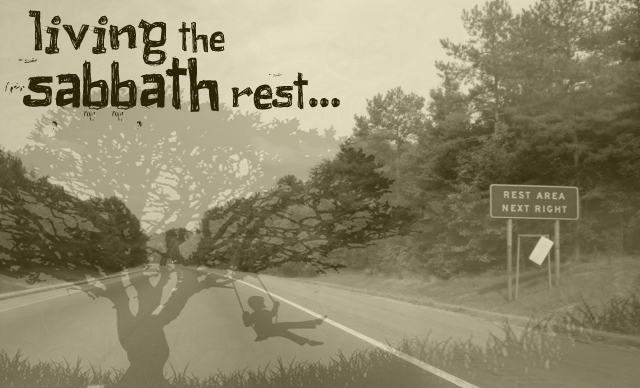Sabbath Rest

 There was a good reason that God invented the Sabbath, and I think that’s doubly important for writers. Our minds never stop. We often feel driven to do, write, be. We’re always pondering, dreaming, thinking. But we need to stop and take some time to honor the Sabbath as well as our body, mind, and spirit.
There was a good reason that God invented the Sabbath, and I think that’s doubly important for writers. Our minds never stop. We often feel driven to do, write, be. We’re always pondering, dreaming, thinking. But we need to stop and take some time to honor the Sabbath as well as our body, mind, and spirit.
- Rest your body.
Get your sleep. Take time to do—dare I say it?—nothing. Just sit. Just relax. Our culture is frantically pushing us to the point of craziness and so does the publishing industry.
Busy is not the best.
- Rest your mind.
I have a notebook beside my bed because my mind often doesn’t stop at night. I wake up and have an idea about a character, a plot point, a setting detail—whatever. Without it, I’ll ponder it and lose sleep. If I write it down, I can come back to it later.
Sometimes we need to rest our mind for awhile and just stop and daydream. Stop checking Facebook. Stop watching TV. Just stop.
Let our poor overworked brains rest.
- Rest your spirit.
Ever watch children play with abandon? Their spirits are unencumbered and free to enjoy life. We should play too.
We get too serious, too determined, too competitive, too driven. Sometimes we just need to take some time to enjoy watching a bunny hop around our yard or take a walk and enjoy the beauty of nature or lie in the grass and play the cloud game. It reignites our creativity and energizes our spirit.
So how do I take a Sabbath rest? Hope these ideas might help you too.
- Besides going to church, I try to stay off my computer (unless, of course, I can skype with the grandchildren—then all bets are off!). I avoid social media, writing, or doing anything connected to work.
- I try to do something in nature—take a walk, sit in the yard, etc.
- I enjoy on a nice meal or just a special dessert.
- I spend some special time with my wonderful husband.
- Sometimes we spend time with friends.
- I often call someone that I haven’t talked to in awhile.
- I read or watch TV for pleasure not for research (i.e. work).
- I spend some time praying for the upcoming week.
How do you take a Sabbath rest? I’d love to know!
An Iron-sharpening Adventure

 “As iron sharpens iron, so one man sharpens another.” Proverbs 27:17
“As iron sharpens iron, so one man sharpens another.” Proverbs 27:17
I thoroughly enjoy the iron sharpening iron aspect of our monthly Picture Book Critique Group meeting. Each of us always brings a fresh and interesting perspective to the manuscripts, perspectives that likely would be shared by many readers. As we’ve built trust and respect for one another, our critiques have become more and more helpful, and we’ve grown as writers and people.
I know that many of us fear our work being harshly criticized instead of productively critiqued. This is often what keeps writers from joining a critique group or keeps them from even sharing their work with trusted friends. But when friends, colleagues, or partners have a shared vision of wanting to make the manuscript better, well, that can lead to a sharper piece of writing—and a sharper writer.
The keys to productive critiquing are trust and humility. Why is having a critique partner(s) important?
- No two people think alike, so each critique partner brings a fresh perspective.
- Each person has strengths that can balance your weaknesses.
- Critique partners often think of plots, words, or directions you’d never think of.
- If you’re stuck in an area, your partners can often help you get unstuck.
- One or more people can help you brainstorm ideas, problems, plots, words, and more.
- Working with each other helps you realize you’re not alone.
- Everyone has weaknesses, so you can see be encouraged to grow as well as see your strengths.
Our critique group found each other at a children’s writing seminar. I think that was positively providential! I also have fiction critique partners all over the globe who help me with my grown-up fiction work. So where can you start on your iron sharpening iron adventure?
- Ask God to bring someone to partner with you. It’s a lonely road if you don’t have others who will encourage and sharpen you.
- Make sure you have a humble and teachable heart. If you’re afraid, ask God to help you.
- Start simple. As a friend who reads a lot to give you some feedback.
- As you get to know other writers, ask them if they’re involved in a critique group. If not, ask them to join you and create your own.
- Ask someone who is strong in areas you are weak (and vice versa).
- Be ready to give back; be gentle, helpful, and encouraging as you critique another’s work.
- Pay for a professional editor’s critique either at a conference or through someone you know.
Remember that you need to help others as much as you need help. Sharpen each other and your work and you will grow in amazing ways!
Have you been in a critique group? I’d love to hear about it!
A Measure of Loss

 When change happens, there’s always an element of loss no matter how slight. When I left teaching, I lost my students. When I moved, I left friends behind. When I changed churches, I missed my brothers and sisters in Christ. And when I left a ministry where I worked, I missed the daily interaction of my former colleagues. Though each of these was a good change, a needed change, a healthy change, there was still an adjustment to be made.
When change happens, there’s always an element of loss no matter how slight. When I left teaching, I lost my students. When I moved, I left friends behind. When I changed churches, I missed my brothers and sisters in Christ. And when I left a ministry where I worked, I missed the daily interaction of my former colleagues. Though each of these was a good change, a needed change, a healthy change, there was still an adjustment to be made.
In any kind of change, you are leaving behind the known and are expected to embrace the unknown. That’s not easy. It’s often scary. And it’s never comfortable. Every change brings a new direction, a new perspective, and if you let it, a greater faith. Yet every change also brings a measure of loss.
You lose independence and your singleness when you marry. You lose freedom, time, and all kinds of other things when you have a baby. Then, as that baby grows, each age and stage brings boatloads of changes, sometimes multiple times a day! No wonder a mother feels undone when her child enters school or a father freaks out when his daughter has her first date.
So when does change end? Never! The ancient philosopher, Heraclitus, accurately reminded us that, “Nothing is permanent except change.” So why do we have such a love/hate relationship with change? Because any change feels uncomfortable at best.
Whenever we are out of our comfort zone, it’s usually not fun. Something as simple as a snowstorm, a new school year, a bout of the flu, or a home remodeling project can send a family into transition, and the unexpected often takes us by surprise. Yet it’s how we handle that change is important to God and to those around us. After all, our children are watching, and they are learning how you deal with change, with loss, and with transition.
How have you dealt with change lately? I’d love to know.
Growing Together Spiritually

 As this new year gets underway, it may be a good time to revisit your spiritual needs—individually and as a couple—and discuss how can each of you can help meet those needs. As we grow and mature, our needs often change, so it’s good to adjust to them accordingly.
As this new year gets underway, it may be a good time to revisit your spiritual needs—individually and as a couple—and discuss how can each of you can help meet those needs. As we grow and mature, our needs often change, so it’s good to adjust to them accordingly.
First, if you haven’t already, find a church and commit to attend regularly. Next, be sure to pray together. For some, this isn’t easy, but start by saying a prayer before meals. Then you can learn to pray at other times and for other things—for safety on a trip, for God’s will, and for His plan for your marriage. If you’ve let either of these fall by the wayside, reignite your commitment to prayer and fellowship.
Third, plan to grow spiritually together. If you aren’t in one, find a Bible study or small group with other couples with whom you can “do life” together. If your church doesn’t have a group, start one!
Fourth, find another couple and ask them to mentor you. Meet with that couple every few weeks or monthly. Be honest, transparent, and inquisitive. Ask them how to deal with issues you’re encountering. Seek their advice on struggles you may have. And be accountable to them for your walk together as well as individually.
Fifth, but possibly the most important, maintain your covenant commitment to God and to each other. Choose, daily, to maintain and develop your walk with God through faithfully growing in His ways. It’s not always easy, but who expects that everything should be easy?
Finally, realize that, as you grow and mature spiritually, these needs will continue to change. Life is ever changing, and so is your spiritual life.
Adapted from The ReMarriage Adventure: Preparing for a Lifetime of Love & Happiness and Countdown for Couples: Preparing for the Adventure of Marriage. Copyright © 2012, all rights reserved.
Preparing for the Adventure of Change

 It’s a new year, and I suspect there will be many changes in store for all of us—the good, the bad, and maybe even the ugly. Whether it’s in relationships, parenting, careers, schooling, church, moving, or more, each of us will likely face lots of changes in 2016. But how do we handle the changes that come our way?
It’s a new year, and I suspect there will be many changes in store for all of us—the good, the bad, and maybe even the ugly. Whether it’s in relationships, parenting, careers, schooling, church, moving, or more, each of us will likely face lots of changes in 2016. But how do we handle the changes that come our way?
I sure haven’t dealt with change perfectly. Sometimes I’ve done okay; other times I’ve dealt with a change rather pathetically. But, by God’s grace, I’ve always trusted that God truly had me on a great adventure. Somehow I understood that these times of change were just chapters in my bigger story, so I hung in there until I could turn the page.
Sometimes, I dug in my heels and merely endured it and, frankly, I didn’t learn the lessons that a situation was meant to teach me. Most of the time, though, I embraced the things that God brought my way and allowed the challenges and changes of life to transform, at least parts of me, into the woman he wants me to become. It’s rarely been easy, and I know that he’s not done with me yet.
Though change is a natural and normal part of life, it rarely feels natural or normal. So how do we handle change? When something changes, are we ready to walk through it, get to the other side, and set a good example for our children—or for anyone who is watching? Do we know how to maintain our integrity, our faith, our peace, and our joy, even when unexpected changes come our way? Change truly is an adventure, and it’s best to prepare for it as best we can.
What changes might you face this year? I’d love to know and will pray for you. Please leave a comment and stay in touch. Blessings!
Be-Attitudes for the New Year

 Emotions, stress, expectations, and frustrations can easily find their way into the blending family life, so it’s important for you as a couple to try and address probable stressors ahead of time. Because our attitudes have a lot to do with our actions, here are eight be-attitudes that can help you manage your blending family emotions, attitudes, and decisions:
Emotions, stress, expectations, and frustrations can easily find their way into the blending family life, so it’s important for you as a couple to try and address probable stressors ahead of time. Because our attitudes have a lot to do with our actions, here are eight be-attitudes that can help you manage your blending family emotions, attitudes, and decisions:
• Be positive: Prioritize what’s most important and why, and don’t sweat the small stuff. Tackle the mundane with a positive attitude and enthusiasm, even if it’s planning your new year resolutions. And be sure to model a positive attitude for your kids.
• Be unselfish: Pull your own weight. Don’t expect the other to do all—or even most—of the work. Do your fair share and don’t keep score if you feel you’re pulling more of the load at times. Especially as you look to the new year, this is a gift that keeps on giving.
• Be willing to use your skills and abilities: Use your strengths. If he’s a good cook and she’s a good organizer, go for it. Don’t feel tied to traditional duties—but use each other’s skills to your mutual benefit. And that should go for the kids, too!
• Be a team: Take on work as a team or “divide and conquer.” Just be sure to choose duties together and compromise peacefully when necessary. Model for your kids how to do this well.
• Be servants: Just as Jesus washed His disciples’ feet, serve each other—by doing something without the other knowing it or by making dinner when the other has had a tough day—serve with a true servant spirit.
• Be content: You know that there are always things to be done, but avoid becoming discontent and grumbling. Extra chores during the blending family adjustment season are a part of life, so be content with the transitions that come.
• Be adaptable to change: When one of you is sick or has too much on their plate, the other can pick up the slack. And show your kids that life is full of change and it’s best to have a be-autiful attitude about it.
• Be careful to use time management: We can always put off those mundane things, but they’ll just pile up and get worse. Manage your time so you can deal with things on a daily or weekly basis; this will keep your holiday schedules running more smoothly.
Adapted from The ReMarriage Adventure: Preparing for a Lifetime of Love & Happiness and Countdown for Couples: Preparing for the Adventure of Marriage. Copyright © 2012, all rights reserved.
